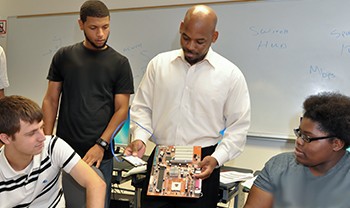Information technology security careers have seen a steady growth in the last couple of years due to higher demand. Everyone today seems to have at least one electronic device on their person at all times. This can be a tablet, smartphone, laptop computer, desktop, MP3 player, and the possibilities are limitless. With the growing demand for electronic devices, so does the demand to keep them and the information they carry secure.
Not only has the need for technology grown, but it’s evolving every day. Just name a few examples is the ability many smartphones have to download coupons, plane tickets, credit cards, and more right to the device. When this type of information can be made available on a smartphone, this also means there are people waiting to take it too.
Security Engineer
 Security engineers is one of the many information technology security careers we’ll be covering today. Security engineers are responsible for building and maintaining IT security solutions within the company. Their duties usually involved investigating intrusion incidents, configuring firewalls, testing new security solutions, and other duties.
Security engineers is one of the many information technology security careers we’ll be covering today. Security engineers are responsible for building and maintaining IT security solutions within the company. Their duties usually involved investigating intrusion incidents, configuring firewalls, testing new security solutions, and other duties.
People who wish to pursue this career path need a good technical background in penetrating and vulnerability testing, encryption technologies, virtualization security, and application. They also have to be well versed in web and network related protocols too. The more concepts and tolls a security engineer is familiar with, the more they’re able to troubleshoot problems with a company’s security systems.
Security Manager
The security manager is the person in charge of managing a company’s IT security policy. These people possess strong communication skills, interpersonal skills, and leadership skills. Individuals interested in this career field need to be strong in these skills, but also able to execute and create security strategies based off the input they receive from their security director.
The leadership role is not only essential, but imperative for helping a team to move forward. They have to implement and test new security tools, administer staff schedules and budgets, and also lead campaigns about security awareness. Security managers will have a strong background in IT strategy, programming, and enterprise architecture.
Security Director
Security directors are usually senior level employees in information systems security. They’re tasked with overseeing IT security measures throughout a company or organization. They are often responsible for allocating resources, designing, and manage security programs in the security department. Security directors often have to create user awareness and security and also comply with security education campaigns too. Security directors will also interact regularly with non-management employees and offer key assistance to law enforcement if a security investigation or incident occurs.
Security directors will need a background knowledge of security related concepts, enterprise architecture, and IT strategy too. They will also need to possess strong leadership and communication skills to lead their team effectively. They will often be working with non-management employees on a regular basis and provide assistance where needed too.
Security Architect
 Security architect is another senior level employee who is responsible for maintaining and building the network and computer security infrastructure of a company or organization. The position requires people to have a comprehensive picture of the information and technology needs of a company or organization. They use this to test and develop security structures designed to protect these systems.
Security architect is another senior level employee who is responsible for maintaining and building the network and computer security infrastructure of a company or organization. The position requires people to have a comprehensive picture of the information and technology needs of a company or organization. They use this to test and develop security structures designed to protect these systems.
People interested in this position should be knowledgeable in risk assessment, operation systems, perimeter security controls, technical skills, operating systems, and ITIL and COBIT frameworks.
Each of these positions requires applying the right information, knowledge, and expertise in the field. This also requires an intimate knowledge of computers, security systems, and at least some experience in the field. Each of these positions is very important in helping to keep security computer systems not only safe, but to continually operating too. There is a wealth of information that goes into keeping these security systems running and requires skilled individuals to oversee them too.
For more information about graduation rates, the median debt of students who completed the program, and other important information, please visit our website: https://iticollege.edu/disclosures/

